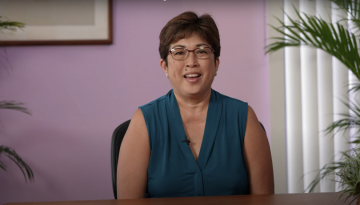Fraud & Scams
by Barbara Isobe, American Savings Bank
My name is Barbara Isobe, I am the Fraud Manager at American Savings Bank. I will be discussing fraud and scams, and how to know you might be involved in a fraud or a scam.
What do fraudsters want? They want to take your money and they’ll do whatever it takes to trick you to get your money.
What do our bank customers want? They want to be happy, secure, to be able to pay their bills on time, to have companionship, to help others, and a place to live. These are things that provide our customers, and most people, with comfort. So what the fraudster is going to try to do is trick people into feeling that the things that they want are being threatened.
The first thing fraudsters will do is make friends with you. If I were to walk up to you on the street and say, “Hey, can you give me $1,000?”, you most likely will say no. But if I was your friend, you might consider giving or lending me that $1,000.
Secondly, fraudsters may scare customers. They will say something like, “Hey, you’re in trouble. You didn’t pay your bill. You didn’t do something you were supposed to be doing. Your bank card is blocked, we are not able to help you.”
Fraudsters also try to act like service providers to our bank customers. They will say something like, “Hey, we’re following up on your account. Hey, we would like to give you a job where you can work from home.” They might also pose as another company, such as a utility provider.
Fraudsters will spend a lot of time cultivating a relationship. Most times, communication will be faceless: they’ll call you, they may use email, they may text you, and a lot of social media. Once they know they have the connections, they will ask you for things like, “Hey, can you give me money?” They will build up rapport until you are more willing to lend them money to help them in a bad situation. They may ask you for commitment, so some may establish being your boyfriend or girlfriend. They may even ask you to marry them. They may ask you for financial help: “Hey, I can’t get from Dubai to Honolulu. Do you think you can help me by sending some money to pay for me to get there? Or help me do the paperwork for me to get to Hawaii?” They may also ask you for secure information: “I am stuck working on a boat. I’m getting these checks, and I want to deposit them to my account so I can pay my bills. Is it possible for me to deposit them directly into your account? Will you please give me your online banking information so i can mobile deposit those checks?” These are some ways they cultivate a relationship. Fraudsters want to be your friend. They want to make you feel comfortable in being willing to give them money or information.
Fraudsters will try to scare you by saying things like, “Hey, we’re the government and you didn’t pay your taxes.” Or, “There’s something wrong with your taxes. We’re going to audit you or we will shut off your utilities, like your electricity or your water.” Sometimes it’s “We will block your debit card. We haven’t heard from you. We’re concerned, so the bank is going to block your account and your debit card.” “We’ll evict you. You didn’t pay for rent.” Or also things like, “We’ve overcharged you so we’re going to give you money back. Please give us your login information so we can credit your account.” The one I am unfortunately most familiar with is grandparent scams. They will call you and say, “I am your grandson, your niece, etc. I’m locked up in jail. i’m in trouble. Please send money right away.” And they will continue to keep calling you. They try to scare you into quick action.
When fraudsters pose as service providers, they will most likely solicit you over the phone, email, or text. They’re going to try to sell you something. They’re going to try to solicit you for a job that you did not apply for. They’re going to solicit you for a credit card or loan. They’ll tell you that you have won the lottery or the sweepstakes. Most of the time, they will say, “You’re going to get money, so we’re going to send you a check. Can you send us money back?” They may also tell you, “Can you please send us the funds up front, and then we will get you in this big lottery or sweepstake in exchange?” In return, they ask for things like money, secure information, and financial help. They’re going to tell you, “We’re going to deposit your winnings in your checking account, so give us your online banking information.” These things are not the normal types of things service providers will ask. Real service providers may work with you to try to get the money to your bank, but they won’t ask you for things like your login access, debit card information, or your PIN. Those things are not needed to get you any funds that you are deserving of.
Here are some tips to avoid becoming a victim of fraud.
Always be suspicious. Fraudsters try to create rapport with you so that you let your guard down. Ask yourself, “Do I really know this person? Do these stories that they’re telling me make sense?” Fraudsters will spend a long time creating a relationship with you. I have heard of relationships that have gone 1-2 years before they even ask for money, but that’s because fraudsters have the time to sit around and cultivate multiple relationships with people they don’t know through social media.
Never give out your secure information, including and not limited to, your online login, debit card number, PIN, account number, and Social Security number. Customers can send payments to other people using only debit card information, so if they have those numbers, they can take money from your account.
Never rush. The fraudsters want you to rush. They always want you to hurry up. “Grandma, hurry up and send me money!” or “I’m stuck in Dubai, and I am in deep trouble. Please send me money for my attorney. Can you send the cash in the mail?” That’s another big no-no. Sending cash through the mail is very dangerous because once it’s sent, that cash is gone.
Always check your accounts. Review your accounts regularly and check for suspicious transactions. If you have online banking access, you should take a look at it regularly. In addition, most companies that deal with credit cards and banks will have a setting on their online banking which allows you to have notifications sent to you. So if money is being taken out of your account, you will immediately know.
For additional information, you can visit our American Savings Bank website at www.asbhawaii.com. Our security and fraud section is located at www.asbhawaii.com/security-fraud-privacy. We can also be reached by phone at (808) 627-6900 or our toll-free number (800) 272-2566. If you have any questions, please give us a call.










